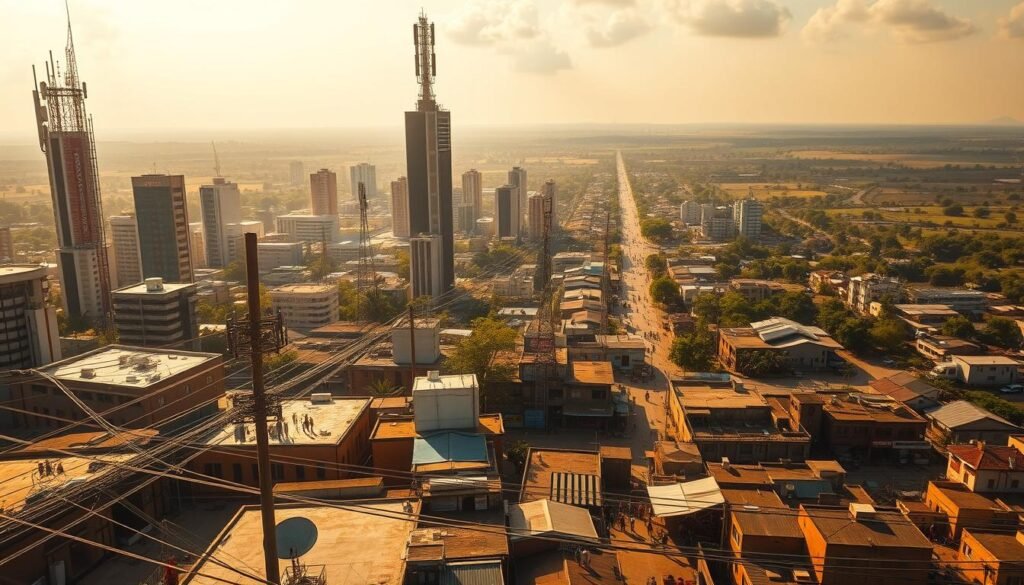What if one person could transform an entire continent’s future through both business and charity? Sir Mohammed Fathi Ahmed Ibrahim, a Sudanese-British billionaire, did exactly that.
Born in 1946, he built a massive communications company called Celtel. It served millions of people across 14 African countries. His work brought modern networks to places that needed them most.
In 2005, he sold his company for $3.4 billion. Instead of retiring, he used that wealth to help others. He started the Mo Ibrahim Foundation to improve governance and support good leaders in Africa.
This article explores his journey from entrepreneur to philanthropist. Learn how his investment in people and health continues to change the world year after year.
Key Takeaways
- Mo Ibrahim founded Celtel, a major African mobile network company.
- He sold his business for $3.4 billion in 2005.
- His foundation promotes better governance in African countries.
- He is recognized among the world’s most influential leaders.
- His work shows how business success can drive positive social change.
Early Life and Educational Foundation
Early life experiences and academic pursuits laid the groundwork for what would become an extraordinary career. This period shaped both technical skills and global perspective.
Sudanese Origins and Family Background
Born on May 3, 1946, in Sudan, this future leader came from Nubian heritage. He was the second of five children in his family.
During his youth, the family relocated to Alexandria, Egypt. His father worked for a cotton company while his mother emphasized education for all her children.
Academic Pursuits in Engineering
He pursued higher education with focus and determination. First, he earned a bachelor’s degree in electrical engineering from Alexandria University.
This foundation in technical studies prepared him for advanced work. Later, he moved to England for further specialization.
He completed a master’s degree in Electronics and Electrical Engineering at the University of Bradford. His education continued with a PhD in Mobile Communications from the University of Birmingham.
Formative Professional Experiences
In 1974, he began his career at Sudan Telecom. This early experience provided hands-on knowledge of telecommunications operations.
Working in Africa gave him practical insights into the industry. He understood the specific needs of people in different areas.
This time proved valuable for his future business ventures. It showed how technology could improve health and connectivity across countries.
The combination of African roots and global education created a unique perspective. This blend would later drive his investment in communications infrastructure.
Building a Telecommunications Empire
Corporate experience at a major British telecom provider would soon fuel an entrepreneurial vision that would transform African communications. This period marked the transition from technical expertise to business leadership.
From British Telecom to Entrepreneurial Ventures
The founder began his corporate journey at British Telecom. He served as technical director for Cellnet, now known as O2.
This role involved launching the UK’s first cellular network. The experience provided deep knowledge in mobile communications operations.
In 1989, he took an entrepreneurial leap. He established MSI, a consultancy and software company focused on telecommunications.
The company grew significantly over eleven years. In 2000, MSI was sold to Marconi Company, marking a successful exit.
The Vision and Growth of Celtel
In 1998, a new venture emerged from MSI. Celtel was spun off as a mobile phone operator targeting African markets.
Banks showed reluctance to invest in African projects. The company used equity financing instead of traditional loans.
Growth was rapid and impressive. By 2005, Celtel served over 24 million subscribers across 14 African countries.
The workforce reached 4,000 employees. Remarkably, 98% were African, promoting local employment and expertise.
Transforming African Mobile Communications
The impact on the continent was profound. Mobile phones brought both economic and social benefits to underserved areas.
Connectivity improved access to services and information. The network transformed daily life for millions of people.
In 2005, the company was sold to Kuwait’s Mobile Telecommunications Company. The sale price reached $3.4 billion.
Later reflections suggested the sale might have been premature. However, it proved highly profitable for all stakeholders.
This success earned recognition for transforming a continent through technology. The founder was ranked first in the 2008 Powerlist of influential Black Britons.
Post-sale activities included founding Satya Capital Limited for African investments. Since 2010, he has supported the UN Broadband Commission for Digital Development.
Mo Ibrahim’s Philanthropic Vision
After building a massive telecommunications empire, the entrepreneur turned his attention to creating lasting social change. His vision extended far beyond business success to address fundamental issues facing African nations.
Establishing the Mo Ibrahim Foundation
In 2006, the founder launched the Mo Ibrahim Foundation with headquarters in London and Dakar. This organization focuses on strengthening leadership and governance across Africa.
The foundation represents a significant shift from corporate operations to social investment. It aims to create sustainable development through improved public services.
The Ibrahim Index of African Governance
Each year, the foundation publishes a comprehensive ranking of all 54 African countries. This index uses 90 indicators across political, social, and economic categories.
Governance is defined as the delivery of public goods and services citizens rightfully expect. The data-driven approach provides transparency and accountability for leaders.
This tool helps identify areas needing improvement in health, education, and economic development. It has become an essential resource for policymakers worldwide.
The Mo Ibrahim Prize for African Leadership
In 2007, the foundation introduced a prestigious award recognizing exemplary African heads of state. The Ibrahim Prize offers $5 million plus $200,000 annually for life.
Recipients must demonstrate excellence in security, health, education, and economic development. They must also transfer power democratically after their term.
The first recipient was Mozambique’s Joaquim Chissano in 2007. Nelson Mandela was named an Honorary Laureate that same year.
Most recently, in 2021, the prize was awarded to Niger’s Mahamadou Issoufou. This recognition highlights leaders who prioritize their people’s welfare above personal gain.
The foundation also hosts the annual Ibrahim Governance Weekend. This event brings together global leaders to discuss African progress and challenges.
Educational scholarships at University of Birmingham, SOAS, and London Business School support future African leaders. These programs invest in the next generation of change-makers.
Through The Giving Pledge, the founder committed to donating at least half his wealth to charity. This commitment ensures continued support for governance initiatives across Africa.
Recognition and Global Impact
Global recognition has consistently followed this visionary’s transformative work across multiple continents. His achievements have earned prestigious honors from international organizations and governments worldwide.
International Awards and Honors
The founder received numerous prestigious awards throughout his career. In 2007, he earned the GSM Association Chairman’s Award for Lifetime Achievement.
That same year, The Economist honored him with their Innovation Award for Social and Economic Innovation. The BNP Paribas Prize for Philanthropy followed in 2008.
Later accolades included the Clinton Global Citizen Award in 2010. He received the Eisenhower Medal for Distinguished Leadership and Service in 2014.
African nations also recognized his contributions with high honors. Senegal’s President awarded him Commander of the Order of the Lion in 2014.
Morocco’s King granted him Commander of the Wissam Arch that same year. These state honors underscored his recognition by African leaders.
Influence on African Development Policies
His work significantly shaped development policies across African countries. The Mo Ibrahim Foundation’s governance index became an essential policy tool.
This data-driven approach influenced how nations approach governance and development. It helped prioritize areas like health and education across the continent.
Many governments now use the index to measure their progress. The foundation’s work has become integral to development discussions worldwide.
Policymakers regularly reference the foundation’s research. This demonstrates its substantial impact on African development strategies.
Continuing Advocacy for Good Governance
Mohammed Ibrahim continues advocating for improved governance through multiple organizations. He serves on the board of the Council on Foreign Relations.
He co-founded the Africa-Europe Foundation in 2020. This organization promotes stronger relations between the two continents.
His involvement with the B Team focuses on responsible business practices. He also contributes to the Commission on State Fragility.
These roles allow him to influence global policy discussions. His advocacy work reaches people across the world.
In 2023, he received appointment as Knight Commander of the Order of St Michael and St George. This recognized his services to charity and philanthropy.
His ongoing work inspires current and future leaders across Africa. The founder‘s legacy continues to grow with each passing year.
Conclusion
From building a revolutionary telecommunications company to establishing a groundbreaking philanthropic foundation, this entrepreneur’s journey demonstrates how business success can fuel meaningful social change. His work with Celtel connected 24 million subscribers across African countries, transforming mobile communications and economic opportunities.
The sale of his company for $3.4 billion enabled his transition to philanthropy. Through the Ibrahim Foundation, he created tools like the governance index and leadership prize that promote transparency and excellence across the continent.
Mohammed Ibrahim continues influencing development through various boards and initiatives. His recognition includes numerous awards and knighthood, validating his global impact on governance and digital advancement.
This remarkable story shows how technical expertise, business vision, and social responsibility can combine to create lasting progress. His legacy inspires new generations of leaders across Africa and beyond.
FAQ
What is the Mo Ibrahim Foundation best known for?
The Mo Ibrahim Foundation is best known for its work promoting good governance and exceptional leadership in Africa. It publishes the annual Ibrahim Index of African Governance and awards the Ibrahim Prize for Achievement in African Leadership to former heads of state who have demonstrated excellence during their time in office.
How did Mo Ibrahim make his fortune?
He built his fortune by founding Celtel International, a pioneering mobile phone company that successfully operated across multiple African countries. He sold the company in 2005 for over billion, which provided the capital for his subsequent philanthropic work.
What is the purpose of the Ibrahim Prize?
The Ibrahim Prize aims to celebrate and honor former African executive heads of state who have developed their countries, lifted people out of poverty, and paved the way for sustainable and equitable prosperity. It is one of the world’s largest individual prizes.
How does the Ibrahim Index of African Governance work?
The index is an annual comprehensive statistical assessment that measures the quality of governance in every African nation. It uses over 100 indicators across four key categories: Safety & Rule of Law, Participation & Human Rights, Sustainable Economic Opportunity, and Human Development.
Why did Mo Ibrahim transition from business to philanthropy?
After the successful sale of his telecommunications company, he chose to focus his efforts and resources on addressing the critical issue of leadership and governance in Africa. He believes that good governance is the fundamental key to unlocking the continent’s potential and improving the lives of its people.







